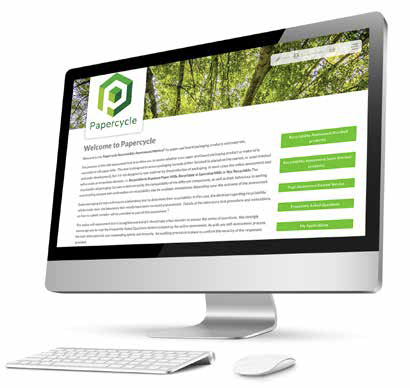Introducing Papercycle, the UK’s first comprehensive recyclability assessment and certification service for fibre-based packaging
 Today marks a turning point for the UK’s Paper-based Industries with the launch of Papercycle: a ground-breaking recyclability assessment and certification service for fibre-based packaging products and materials for the UK and beyond. With Extended Producer Responsibility (EPR) legislation on the horizon, this new service could not arrive at a better time.
Today marks a turning point for the UK’s Paper-based Industries with the launch of Papercycle: a ground-breaking recyclability assessment and certification service for fibre-based packaging products and materials for the UK and beyond. With Extended Producer Responsibility (EPR) legislation on the horizon, this new service could not arrive at a better time.
Developed by the Confederation of Paper Industries (CPI) and supported by the UK’s Paper-based Industries, Papercycle’s automated online tool provides a robust, comprehensive system to assess the recyclability of fibre-based products and materials in a consistent and credible way. It also identifies whether fibre-based packaging materials can be recycled in the UK and which type of recycling mills can reprocess them. Recyclability can be tested at any stage, be it finished or semi-finished products.
Papercycle provides an instant diagnosis on recyclability following the online assessment, but for more complex products or materials, Papercycle can conduct timely laboratory testing under the Confederation of European Paper Industries (Cepi) recyclability test method. Following a laboratory test, Papercycle can provide a technical review service on how a product behaves under lab conditions to give an insight into how the various components interact with each other, diagnose the most critical parts and signpost potential solutions for material modification. Papercycle can thus help prepare fibre-based packaging for certification and expansion in the UK and other markets, subject to local variations and requirements.
Whilst in principle all fibre-based packaging is recyclable, innovations in material development can make some products more challenging to recycle. This means basic recyclability assessments based on visual or a simple compositional analysis are no longer sufficient to capture the complexities of the recycling process and accurately reflect the true recyclability of packaging. Without a comprehensive assessment there could be unintended environmental consequences, such as packaging being sent to a recycling facility where it cannot be processed or increased waste and contamination. Simple compositional analysis therefore potentially jeopardises the move to a more circular economy, and can disrupt the recycling supply loop for business.
To address this, CPI considered local and European industry standards and engaged extensively with stakeholders across the paper industry who are advising on permissible non-fibre levels and parameters to develop Papercycle. Papercycle enables producers to innovate armed with ‘real knowledge’ of the recycling loop, which will help keep fibre-based materials from packaging in use for as long as possible, contributing to a more sustainable future.
With the EPR reforms underway, Papercycle’s certification service could enable a standardised labelling system where customers could receive a ‘recycle’ label as will be required by the UK’s mandatory recyclability labelling on packaging. Packaging certified as “recyclable” will also attract lower Producer Responsibility (modulated) Fees associated with complying with the reformed Packaging Waste Regulations. Furthermore, for consumers, Papercycle can help avoid confusion on what can and cannot be recycled.
Dimitra Rappou, CPI Director of Recycling, said: “As packaging materials have become increasingly complex, we have seen growing confusion over the recyclability of materials, with an over simplified assessment approach threatening the quality of recycling. Papercycle’s new service can remove the uncertainty faced by packaging designers, brands, retailers, and policy makers on the recyclability of fibre-based products. We see this playing a crucial role in promoting a circular economy for fibre-based packaging, helping to reduce waste and lower carbon emissions by keeping materials in use for longer. By providing accurate information on recyclability, Papercycle enables brands and manufacturers to design and develop packaging solutions that contribute to a more sustainable future.”
Lead engineer, Dr Ed Jones, at Kelp Industries Ltd, remarked: “The Product Development Service offered by Papercycle has been crucial in landing some key clients for us. The tailored report and post-assessment technical review with Papercycle allowed us to give confidence to our customers, by demonstrating the recyclability of our new materials, and with external validation directly from representatives of the paper processing industry.”
Visit Papercycle’s website to discover how this new service can transform your fibre-based packaging solutions.
-Ends-
Notes to editors
For more information or to arrange an interview with Papercycle please contact:
Emma Fox 07957534811 or Sam Williams 07949 607029 (Barley Communications)
About Papercycle
Papercycle is a recyclability assessment and certification service dedicated to determining the recyclability of fibre-based packaging formats and materials, including which types of mills can reprocess specific types of packaging for the UK, and beyond. Supported by the UK’s Paper-based Industries it has been developed by the Confederation of Paper Industries.
About Confederation of Paper Industries
The Confederation of Paper Industries (CPI) is the leading trade association representing the UK’s Paper-based Industries, comprising paper and board manufacturers and converters, corrugated packaging producers, makers of soft tissue papers, and collectors of paper for recycling.
CPI represents an industry with an aggregate annual turnover of £11.5 billion, with 56,000 direct and a further 93,000 indirect employees.
CPI unifies the UK’s Paper-based Industries behind the promotion of paper’s intrinsic value as a uniquely renewable and recyclable resource. We aim to enhance the industry’s competitiveness by advocating an appropriate legislative and regulatory regime in the UK, EU and globally, and also by sharing best practice within the CPI membership.